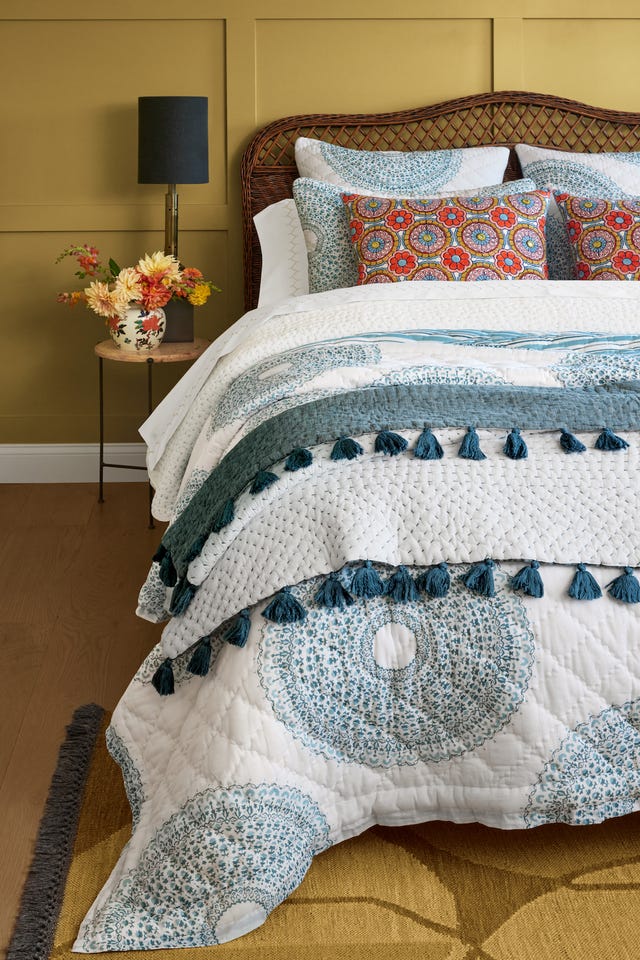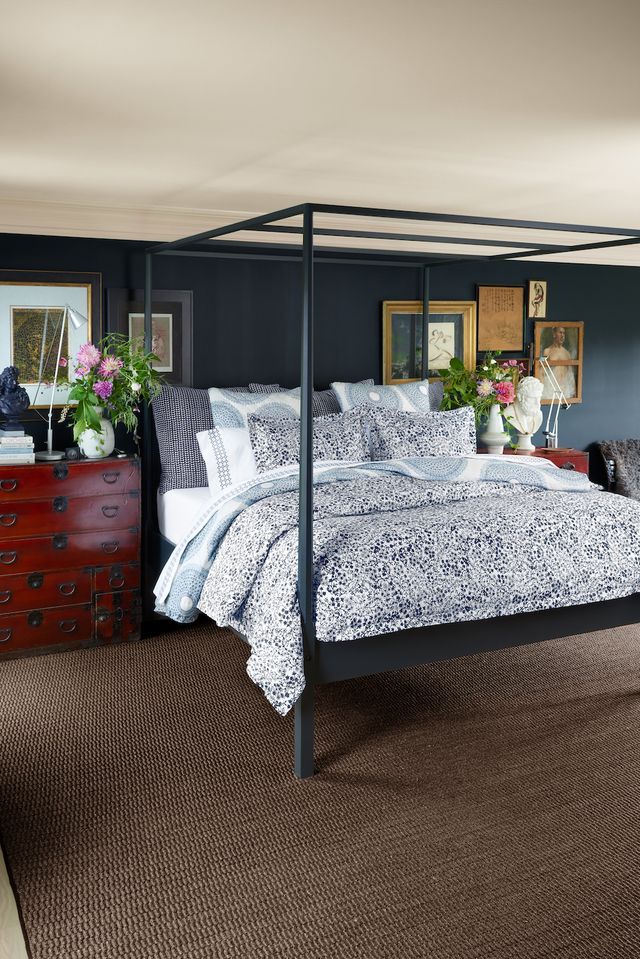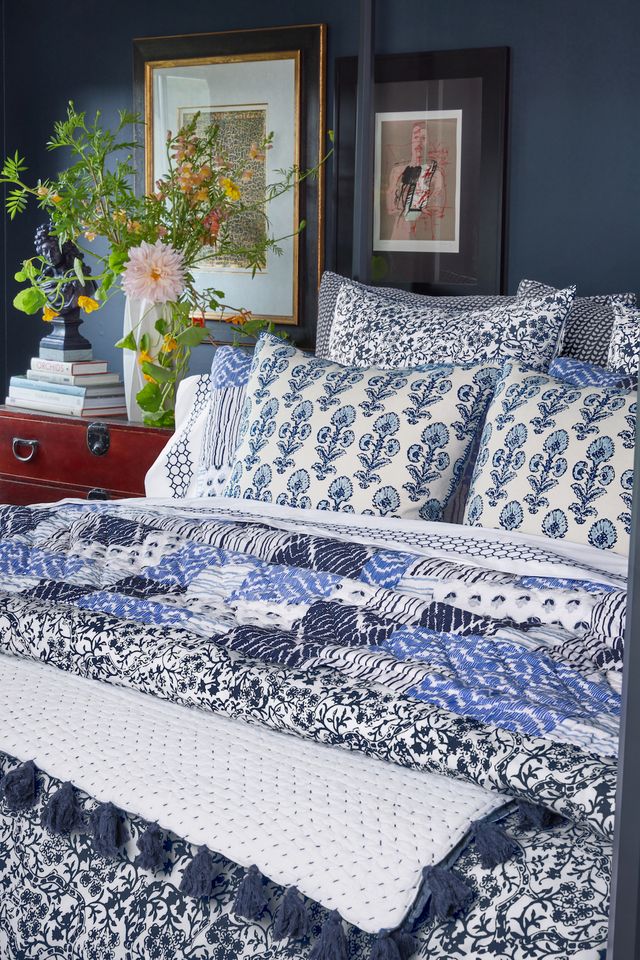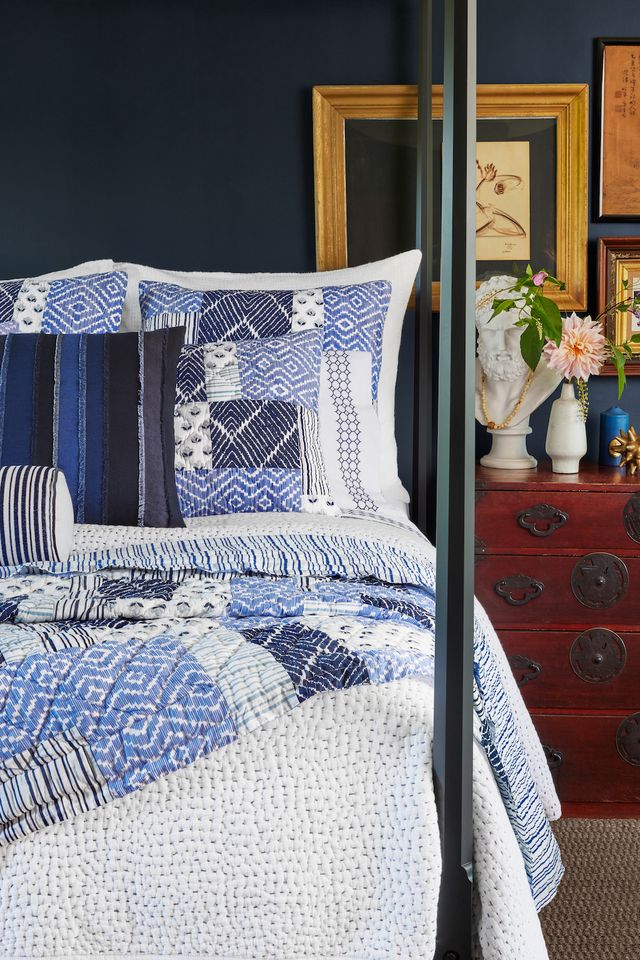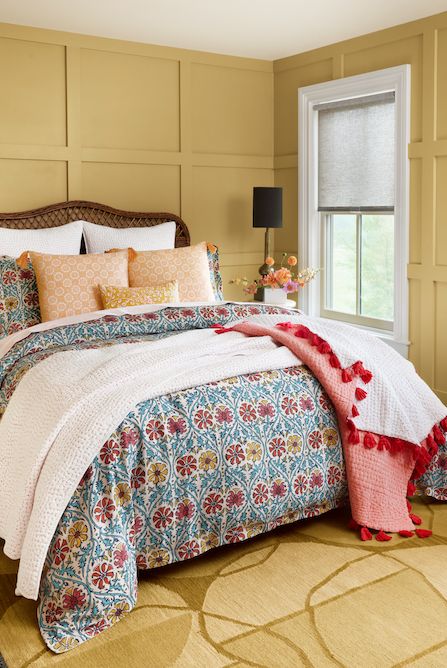You most likely grew up being told that you needed to keep your bedroom tidy, which meant you had to make your bed. But you probably didn’t learn how to properly make a bed—that, or you weren’t practicing close listening and just wanted to get it over with! Either way, you’ve probably realized there’s an art to making a luxurious bed complete with neatly tucked sheets and topped with layers of well-styled pillows, linens, and throws. But we promise a beautiful bed isn’t reserved exclusively for your Instagram feed and five-star hotels. We interviewed luxury textile designer John Robshaw, to get expert advice on how to make a bed with lovely, tidy, and cozy results every time. Robshaw is well-known for his top-notch bedding that interior designers gravitate towards for its impeccable quality and endless style combinations.
First and foremost, Robshaw says: “Decorating your bed should be fun. It takes up a large amount of real estate in your bedroom, and unlike a rug or window treatments, it’s an easy investment to change. If the aesthetics of your bedding stay the same like the prints and the color story, each season you can rebuild it with new combinations.” Ready to learn the basics? Robshaw will take you through his step-by-step guide to properly make a bed below and also share some pro tips along the way to make your bed feel extra special.
Step 1: Steam and Iron Bedding
Before Robshaw makes a bed, he either irons or steams all the bedding. That way, once he’s ready to make the bed, it’s already naked and wrinkle-free. The steamer can also eliminate odors lingering from the packaging and kills dust mites and bed bugs.
More From House Beautiful

Step 2: Put On the Sheets
“The first step is making sure you have your sheeting! You can’t start without that component,” advises Robshaw. First, you must put on the fitted sheet (which is admittedly the one piece of bedding we all dread fitting onto the mattress—but at least you can get this step over which early!). It’s uncanny how often it will pop up on you when attempting to stretch it out. A simple hack to help with this problem is to look for the tag inside the lining of the fitted sheet. Next, place the corner of the fitted sheet with the tag on the bottom right corner, then stretch the other three corners for a perfect fit.
The flat sheet is the next bedding article to place on the bed, but there’s a trick to get it right. “You always put on the flat sheet with the pattern facing down on the mattress so when you fold it back with your next piece of bedding, you can see the print,” advises John Robshaw.
Step 3: Layer On the Coverlet or Quilt
In the following step, add a coverlet or quilt. Robshaw recommends a “hand-stitched coverlet because it’s lightweight, breathable, and perfect for every season.” He went on to share, “Coverlets were designed for warmer weather and they provide the same warmth as a traditional quilt. Think of them as your year-round basic. The only difference is the batting (which is the fill inside the quilt) is thinner. Quilts are a bit heavier in weight and I like to change them out seasonally depending on the color and print.”
Step 4: Drape and Fold the Duvet
Robshaw’s technique for folding a duvet involves “laying it open across the full bed, then take either side and bring it down, so it’s folded in the middle of the bed, and then another little fold after that. I like to have a majority of the duvet falling towards the end of the bed/legs of the bed. This way you can really see the pattern.”
Step 5: Display the Pillows Shams
Robshaw enjoys placing pillow shams on the bed because they add another dimension to bedding. “You can never have too many pillows, in my opinion,” shares Robshaw with House Beautiful. When making a queen-size bed, Robshaw likes to use the following pillow formula “Two euro shams (or you can always go for two king euros), two standard cases that are typically the same print as the sheet, and then two duvet standard shams.” He also shared that if your space can’t accommodate a headboard, ” King-size euros are large enough to be a fake headboard and can comfortably lean against the wall.”
Step 6: Build the Pillowscape
The pillowscape is an opportunity to “Add some more pattern with a bolster or a few decorative pillows to the bedding.” Some of his favorite styling combos include two decorative squares at 22 by 22 inches and one 12 by 8-inch kidney pillow or a bolster at 17 by 32 inches. He also recently started decorating with a 14 by 40 inches shape which is fun across the bed and makes a statement. Look for personality pieces, Robshaw often looks for vintage fabrics that he re-creates into accent pillows for a one-of-a-kind look.
Step 7: Pinch the Throw Blanket
Lastly, use your thumb and pointer finger, grab the throw blanket, and drape it on top of the duvet. Another option that Robshaw likes to use is folding it and placing it on the corner of the bed, “Have fun with the throw; it’s a casual grab-and-go piece of bedding.”
Extra Lux Bedding Tips
Robshaw is well-known for bedding with a maximalist style that interior designers gravitate towards for its impeccable quality and endless combinations. So, of course, had a few extra questions like, how does he achieve these high-style maximalist bedding looks?
“I think a variety of different pattern scales and fun colors matter when it comes to achieving this,” notes Robshaw. “Smaller prints for a sheet set, larger prints for a duvet, adding in a vintage blanket and a few fun decorative pillows to pull the entire look together. This is where it really gets fun to mix and match some vintage pieces with something new and fresh.”
We also were curious how he consistently incorporates vintage pieces in his bedding for a unique look. For Robshaw, “You can’t go wrong with a Suzani blanket. They’re graphic and have punchy colors, and normally have a few colors to pull into a larger story.”
When is it a good idea to use a bed skirt? For Robshaw, ” It depends on the bed frame, but I love seeing custom bed skirts made from my fabric collection. Plus, bed skirts hide under-the-bed storage and create a design statement at the bottom of the bed.”
Lastly, is there ever such a thing as too much pattern? For John Robshaw, “never.”
Follow House Beautiful on Instagram.

